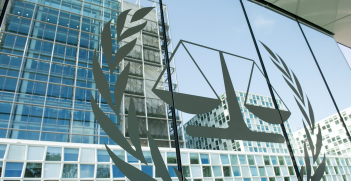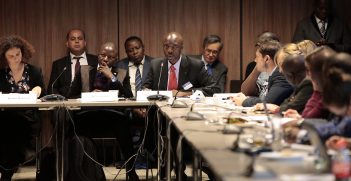Clarifying the Scope of ICC Authority in the Palestine Situation

The ICC Prosecutor’s decision to investigate war crimes in Palestine has been met with various criticisms, some of which hinge on distortions or mischaracterisations of the Court’s functions. These merit correction for the benefit of public debate on this matter.
The International Criminal Court (ICC) has fielded allegations of “illegitimacy” since its inception. Some critics suggest that the Court and its organs, particularly the Office of the Prosecutor (OTP), have exercised their functions improperly or pursuant to some partisan political agenda. Others argue that the Court undermines state sovereignty, including that of states not party to the Rome Statute. These concerns have recently dovetailed into criticisms of the OTP’s decision on 20 December 2019 to commence a formal investigation into war crimes in the Palestinian territories after five years of preliminary examination.
The main legal issue problematising the investigation is whether the Court has territorial jurisdiction over Palestine. We currently await a decision of the Court’s Pre-Trial Chamber (PTC) on this issue, after the OTP voluntarily requested a ruling. Commentary on how the PTC might or should decide has been plentiful, and so I do not seek to contribute to it. Instead, I will respond to certain other criticisms made of the Prosecutor’s decision to investigate, which rest on distortions or mischaracterisations of what the Court and its organs are legally empowered to do. I will demonstrate that most aspects of the decision, notwithstanding the unresolved issue of territorial jurisdiction, are actually routine and lawful.
First, it has been suggested that the ICC is a “UN agency,” and that the investigation into Palestine is also UN-controlled. Whether meant as a factual proposition, or more likely, as a rhetorical device to suggest some impairment of the Court’s functions by the UN, the characterisation is false. Structurally, the Court is in no sense a “UN agency.” It was created by a standalone treaty (the Rome Statute), not as a UN subsidiary organ like the international criminal tribunals for Yugoslavia and Rwanda. It also operates independently of UN oversight. Its administration (e.g. budget and election of judges) is undertaken by the “Assembly of States Parties” to the Court, the OTP is responsible for investigation and prosecution, and judges are responsible for the determination of individual criminal responsibility. While the UN Security Council (UNSC) is entitled to refer and defer situations to the Court, it cannot influence the judicial process post-referral. Although the exercise and nonexercise of these powers to refer and defer present some risk of interference with the Court, the risk is irrelevant to the Palestine situation, as it was referred by Palestine itself – the validity of which is presently under consideration by the PTC.
A second mischaracterisation is that certain war crimes under the Rome Statute that the OTP might investigate are “politicised,” including the crime of transferring civilians into occupied territory under Article 8(2)(b)(vii). It has been implied that the crime was only included in the Statute under persistent pressure from the Arab League, and that this somehow undermines its credibility. Properly contextualised, however, the crime was derived from a rule of international humanitarian law prohibiting such conduct in the Fourth Geneva Convention of 1949. It was not some modern fiction created to oppress Israel; indeed, academic William Schabas has observed that the clause was “well accepted by most delegations,” Israel aside. Similarly, the claim that the statutory crime of aggression undermines a state’s right to use force in self defence is specious, as the crime is constructed so as to operate without prejudice to this right (at least, to the extent of its generally accepted scope and not to a stretched conception thereof as Israel adopts). More generally, if the existence of any political disagreement over a proposed clause in a treaty “politicises” its eventual inclusion, then every clause of every treaty meets this definition, and the characterisation says very little about the credibility of such clauses.
A third mischaracterisation is that Chief Prosecutor Fatou Bensouda’s liaison with figures in the Palestinian Authority gives rise to a reasonable apprehension of bias. This is tenuous, as the success of any OTP investigation depends heavily on developing a cooperative relationship with the government of the territorial state involved. This has been well-documented as a reason for the ineffectiveness of the OTP’s investigation into Darfur. This is the case even if officials within that government are suspected of, or subsequently charged with, crimes within the Court’s jurisdiction. To suggest that evidence of mere cooperation, absent any specific evidence of impropriety, raises an apprehension of bias would cast doubt on every single investigation conducted by the OTP. It simply belies the reality of how an international criminal court operates.
Fourthly, another allegation of bias is made on account of the OTP’s supposed omission of “authoritative pro-Zionist academic literature” in its request to the PTC, and its retelling of the conflict in “politically biased terms” by “lawyer activists.” Not only is the allegation not supported by evidence, but it belies the fact that various core Zionist beliefs, including the legality of Israeli settlement activity and the non-existence of a Palestinian right to self-determination, run counter to international law. To the extent that pro-Zionist academic literature reflects or advances these beliefs, then it is not credible to present it before an international court. It is grossly misleading to characterise as “activism” or “political bias” the OTP’s endorsement of legal positions unambiguously recognised as valid in international law, but which simply do not fit Zionist narratives. Moreover, the fact the request “cleanses any mention” of “Arab terrorism against Israelis” is irrelevant. The request was concerned with the question of territorial jurisdiction, and not allegations into specific substantive crimes; failure to mention such “terrorist acts” does not preclude Palestinians being charged and prosecuted for these acts in future. Indeed, the OTP is (at least in theory) obliged to investigate all parties to a relevant situation on a non-discriminatory basis, even the state that has referred it.
Finally, it is suggested that for the above reasons, the OTP is an “active collaborator” of the Palestinian Authority and Arab League, and engaged in essentially anti-Semitic “lawfare” against Israel. The practice of the Court, however, suggests otherwise. Indeed, as the same critics making such allegations tend to omit from their appraisals, the same OTP has thrice refused to investigate the raid carried out by Israeli military forces on a Gaza-bound aid flotilla in 2010, which resulted in the deaths of nine civilians. This was because, in keeping with its statutory mandate, the insufficient gravity of the situation left no “reasonable basis to proceed.” Moreover, this allegation is premature. It remains to be seen what the PTC will decide on the issue of territorial jurisdiction. If it finds that the Court lacks jurisdiction, then the OTP would be bound not to investigate – an outcome which would surely undermine the piquancy of allegations that the OTP is beholden to Palestinian interests rather than to the limits of its statutory mandate.
In sum, many criticisms impugning the OTP’s decision as procedurally irregular, abusive, or even biased are misplaced. They are used as a stalking horse for strong disapproval of the decision in substance, and perhaps, of the fact that the OTP has these powers at all. Whatever the merits of these separate critiques, it remains that the OTP has, so far, acted within its statutory limits.
Rhys Carvosso is an LLM Candidate at the University of Cambridge, and a former intern at AIIA NSW.
This article is published under a Creative Commons License and can be republished with attribution.





